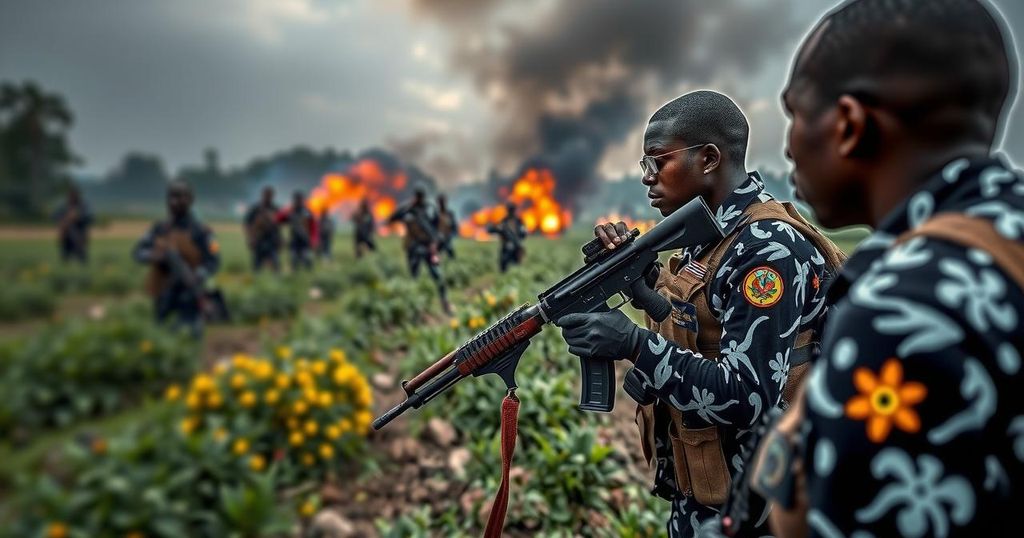Angola has accused the Rwanda-supported M23 rebel group of violating a ceasefire agreement in the DRC following clashes with government-aligned militias. The M23’s occupation of the town of Kalembe has been condemned by Angola as a serious breach of peace efforts, amidst ongoing instability in the mineral-rich eastern DRC that has led to significant humanitarian crises and displacement.
Angola has formally accused the M23 rebel group, which is purportedly supported by Rwanda, of breaching a ceasefire agreement in the eastern region of the Democratic Republic of the Congo (DRC), as reported by the Agence France-Presse on Tuesday. The ceasefire had been established in early August following mediation efforts by Angola between the DRC government and the M23, a militia primarily composed of Tutsi fighters. However, reports indicate that on the most recent Sunday, hostilities erupted between M23 rebels and the Wazalendo militia—an allied force of the DRC government—in a locality situated within the North Kivu province. This engagement has been characterized by local sources as a disruption of the fragile peace that had been negotiated. According to an official statement released by Angola, the M23’s occupation of Kalembe on that Sunday was described as a “flagrant violation” of the ceasefire agreement. The statement further condemned this act as hostile and detrimental to ongoing peace efforts in the region. Eyewitness accounts detail a significant confrontation commencing at dawn on Sunday, during which M23 forces, heavily armed, faced off against the Wazalendo militias. Reports suggest that the M23 successfully took control of Kalembe later that afternoon, displacing Wazalendo fighters who were present. Despite this development, Marcellin Shenkuku, a spokesperson for the Wazalendo, claimed that they have regained control over Kalembe and asserted that no troops from the official Congolese armed forces had participated in the conflict. Angola’s bold declaration, while uncommon in the context of ongoing clashes between the M23 and affiliated militias, has highlighted the continuous instability in the region. Since its resurgence in late 2021, the M23 has expanded its territorial influence significantly throughout eastern DRC, which has resulted in humanitarian crises and widespread displacement of civilians. Kalembe itself, which houses approximately 40,000 residents, is strategically positioned along key access routes that facilitate resource extraction from the mineral-rich Walikale territory, an area known for its deposits of gold, coltan, and diamonds. The continuing violence in this area is fueled by a multitude of rival armed groups, contributing to decades of conflict that span both internal and cross-border dimensions.
The ongoing conflict in the eastern Democratic Republic of the Congo (DRC) has been characterized by a series of violent confrontations among various armed groups, notably the M23 rebels, who claim to defend Tutsi interests. This conflict can be traced back to a complex history involving ethnic tensions, regional rivalries, and historical grievances, leading to considerable unrest and humanitarian crises. The DRC has experienced violence for over thirty years, deeply impacting civilian populations and derailing progress toward peace. Recent mediation efforts by Angola sought to stabilize the volatile situation, culminating in a ceasefire agreement. However, incidents like the recent fighting highlight the fragility of these agreements and the challenges in achieving lasting peace in the region.
In summary, Angola’s accusations against the M23 rebel group for violating the ceasefire in the DRC underscore the persistent volatility of the eastern region. The violence between M23 rebels and government-aligned militias not only disrupts peace efforts but also exacerbates the humanitarian crisis ongoing in this mineral-rich and strategically vital area. The international community must pay attention to these developments in order to support stabilizing efforts and address the deep-rooted issues contributing to the enduring conflict.
Original Source: www.barrons.com






